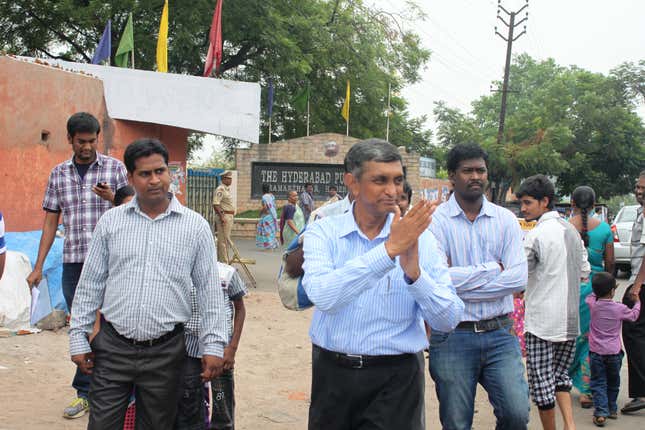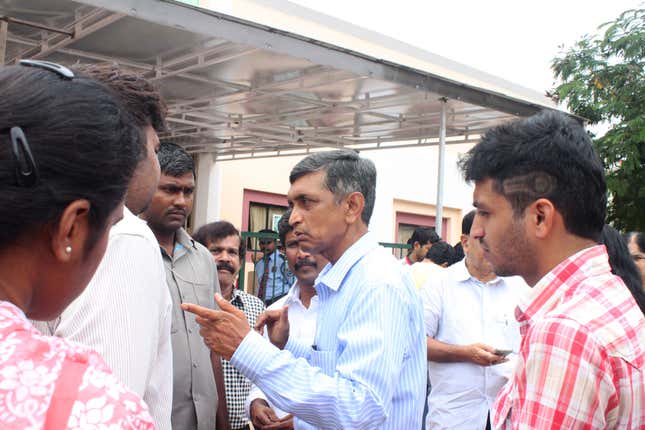
Jayaprakash Narayan is not your typical Indian politician. He doesn’t even wear khadi, the regulation fabric. Eight years before the Aam Aadmi Party burst on to the political scene, Narayan, a former bureaucrat, founded the Lok Satta Party promising a new kind of politics. At its launch on Mahatma Gandhi’s birth anniversary in 2006, he had said the party would “work to eradicate corruption and bring in electoral reforms,” promises similar to AAP’s.
Five years ago, he won a seat in the state assembly. Now he is contesting from Malkajgiri, Andhra Pradesh, the largest Lok Sabha constituency in India with nearly three million electors, which went to polls on April 30. After talks with the Aam Aadmi Party and then the Bharatiya Janata Party about a tie-up fell through, he unilaterally pledged support for Narendra Modi, even though he is fighting Modi’s alliance partner the Telugu Desam Party in Malkajgiri. Narayan’s predicament it typical of small parties, who have to slug it out with the entrenched patronage networks, money and muscle of bigger rivals.

As he speaks about his attempts to reform politics, there is a hint of frustration at the pace of change—which he quickly denies, saying he doesn’t get frustrated because he has “a very strong sense of history.” Yet, the Loksatta Party’s performance in this election could be an indicator of the fate of reformist groups that hope to rid Indian politics of corruption, nepotism, money and muscle power. Narayan considers the confrontational politics of the Aam Aadmi Party immature and unrealistic and believes Narendra Modi is the answer to India’s ills.
Edited excerpts from an interview.
You say that politics, as practiced today, has created unrealistic expectations in people. Could you explain?
Three things have happened. One, in the absence of a local government, for even the smallest thing – an overflowing drain or a street light that needs to be replaced—the expectation is it has to be done by the sarkar [government] and sarkar for them means whoever has been elected. In most minds in India there is hardly any distinction between a panchayat and parliament; the kind of demands [on representatives], even from the middle classes, are the same. I don’t blame them because there is nobody else.
Second, the delivery system is utterly corrupt and inept. Therefore, the political cadres, however corrupt and crooked they are, they are still needed. The expectation is that you maintain an army. The roots of political corruption and decline in this country lies in this.
The third is the electoral system. I am absolutely convinced that our first-past-the-post system has to change.
Do you think the current electoral process has improved over the years?
There are some improvements. For instance, voter registration has increased significantly. Lok Satta played a very critical role. It took me 15 years, but eventually advocacy, pressure from the public and technology significantly helped in improving the process.
But the problem is the election commission by over-interpreting the rules in case of legitimate campaign has tended to stifle true campaign and freedom of expression. The commission and the law is incapable of checking or controlling the real abuse of the process — money and liquor – that continues unabated and therefore, much of the expenditure is now underground.
You were considering tying up with the Aam Aadmi Party…
Yes, we certainly extended a hand of friendship. After all, they are a force of change. They did not take it.
What happened?
They are too immature. They have no understanding of institutions or political processes. They have this notion of black and white (that they are angels and the rest are enemies). They have no recognition that it’s not black and white, there are lots of greys and we must learn to work across the aisle. Parties are not mortal enemies. They are merely competing groups, offering different versions and visions and ideologies and policies. If we, the reformers, do not have the capacity to carry everyone along with us and if we demonize everybody and take extreme postures (it won’t work). The other is their economic vision is totally Luddite. Everything is backward looking. They are not in the real world. That’s why we could not work together.
Are you supporting Modi because you believe decision making will be faster and things would move ahead?
Basically he seems to understand that job creation is the most important thing. I must also tell you candidly that I am impressed that he has the restraint not to offer a single freebie in the last one year. In the midst of all this freebie culture, he is one major national leader seriously bidding for power in a poor country. He is able to attract the young people without offering freebies. That itself shows serious vision. He really has a greater sense of what government is about.
Are you worried that Modi could be a polarizing figure?
No. Because of three things. You must judge his by his conduct now. Whatever happened then (2002) or what the Congress did in 1984 riots and Emergency; we can go back in history and say everybody is bad now. I have to choose between the Congress and the BJP. Let’s be practical. I hated the Emergency as a youngster. I hated the anti-Sikh riots. It was much worse than anything you can imagine in Gujarat. Congress Party fellows were directly involved and the government of India did not lift a little finger to stop it. That is a fact. I can’t be forever bound to history. This man’s (Modi’s) conduct must be judged by current conduct. He has been consistently harping on the themes of India first and one India. Damn it, let’s now rise above this. Even a man like Swami Agnivesh, you can’t question his credentials, feels the same way as I feel.
Second, it’s not about Modi alone. It is about a political party. Great parties change, not because they become more moral, but because they become more practical. They realize that society has moved and in order to get support, they have to change. It is true of the Republican Party or Democratic Party or Tony Blair or Thatcher. More than an election it is the change of a great party that changes the nation. And that seems to be happening. If tomorrow Rahul Gandhi says no dynasty in real terms and real democracy and no freebies, I’m all for it. I can’t forever say you are a dynastic fellow.
Third, we are underestimating the institutions and our people and the media. If you think that one individual can come and take over, it is rubbish. We are a chaotic, messy but glorious country. If democracy is combined with a bit of discipline and a sense of direction, that is not a bad thing. It is good. Let us not confuse democracy with indiscipline and disorder.
You have announced support for Modi but you are also fighting a candidate of his party’s ally in the state.
Yes, we wanted an alliance but for whatever reasons it did not work out. Their (BJP) lead partner in the state is TDP (Telugu Desam Party). Ideally we should contest on our own. But assembly and parliament elections coming together and Narendra Modi dominating, most of the electorate of new politics is also Narendra Modi’s electorate—young people, middle classes, people who would not be swayed by money. For them, if you compete it does not make sense.
That they have come together for both the assembly and parliament further complicates things. But the most important point is there is such intense polarization after years of struggle over the Andhra-Telangana issue and the Congress Party suddenly found it convenient to divide the state days and weeks ahead of the elections. Passions are running high and there is a lot of confusion and polarization over what will happen to Hyderabad, what it means for coastal Andhra and Rayalaseema; this is not the time for new politics to really penetrate. Ideally if the elections were postponed by, say one year, it would have been fantastic for all of us. We would have gone to the people and told them how in the past 5-10 years, these parties’ perfidy has brought us to this situation now.
Do you think the Arab Spring, the Occupy Wall Street movement and the US Presidential elections of 2012 have inspired young people in India as well to participate in the democratic process?
I think you drawing a parallel between Tunisia, Egypt and India is completely off the mark. We are at least fifty years ahead of them. United States certainly. The fact that young people are involved in the political process and the use of social media; almost every young person who has had some education is tech savvy. Therefore, to that extent that generation finds it interesting. Technology and Obama certainly are making an impact on young people, particularly in urban areas.
Is it a fad or does it go much deeper – a conscious involvement in politics and the democratic process?
It is deep. 80% to 85%of the young men and women who are educated find it hard to get any employment. Therefore, it is a real issue. Modi’s rise is not because of Hindutva. He is the only one among major leaders who understood that and he is hammering away at economic growth and job creation and good governance and India first, the things that matter to this group. That is why he suddenly has traction across the country.